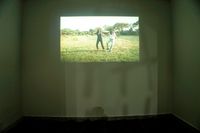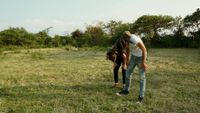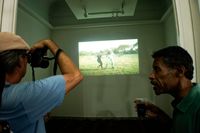SIMULACRO DE COOPERATIVIZACIÓN FORZADA
SIMULATION OF A FORCED COOPERATION
Video-performance
2018
In collaboration with Disbel Roque Bolaño
This video performance is a scene os a fixed take in which both creators yoke together with a yoke of oxen and with it they accomplish the action of making an effort to take opposite roads trying to impose an individuality.
Simulacrum of forced cooperation is an exercise self-imposed on our bodies by our own minds and voluntary creation. The piece questions old conceptions of cooperativisation in which a socialist social project was intended in which all individuals should work together on the same path towards a common goal. The cooperative was a social project that was undertaken with the aim of moving the country towards a sustainable economy, in which each individual would enjoy equal privileges, and work together for the general good.
Simulacrum of forced cooperativization, is an exercise self-imposed on our body by our own minds and voluntary creation. This videoperformance is a fixed shot scene in which both (we) are wearing a traditional Cuban yoke and with it we perform the action of striving each one to take a path opposite to the other. The piece questions old socialist conceptions of cooperativization in Cuba, in which a social project was intended in which all individuals should work together on the same path towards a common goal. The cooperative was a social project that was undertaken with the objective of advancing the country to a sustainable economy, in which each individual would enjoy equal privileges, and work together for the general good.
The physical dispersion of their habitat condemns them to isolation; the relative autonomy of the peasant economy with respect to the logic of capital, which is a brake on the advance of technical progress; their deficient knowledge of the society that surrounds them, which turns them into cannon fodder at the service of the dominant powers. The peasant is thus typified as a conservative social force. Consequently, socialist rural policy should be directed towards the promotion of agrarian proletarianization: while land, as a source of income, would tend to divide the peasants and make them weak, wages would foster their unity, combativeness, class consciousness and political commitment to socialism.1
One of them was that individuals did not feel ownership of what they produced, and by standardizing farm work to a fixed salary and with different internal statuses within the organization, social classes were created within the structure. The president of the cooperative carried one status and the economist another and so on until the worker, but the privileges of the former were null and void for the latter, access to a car, bonuses, vacations in different parts of the country, etc. One of the biggest problems that Cuba suffers is that the administrative apparatus is much higher than the one that produces. 2
The lack of a sense of belonging has been permeating for years; the desire to massify everything without fairly rewarding the efforts makes that, in the long run, individualities are strengthened and nobody cares about the future achievements of the subsequent collective projects to be undertaken. In our opinion, there is a growing individuality that is evident in the present, and that is coupled with the ideological vacuum experienced by some layers of society. The environment is impregnated with a lack of commitment to the social project, which shows a generalized apathy in the Cuban people.
The physical experience of this performance showed us in the flesh a mechanism of delegation. This is how obligatory collective work works when there is an element of force mediating between individuals, the habit.
1 Santiago Muiño, Emilio (2015): Opción Cero. Sustainability and socialism in post-Soviet Cuba: a study of a systemic transition in the face of the energy decline of the 21st century. Universidad Autónoma de Madrid, Madrid. p.551.
2 Interview with Jorge Félix Almarales de Armas. Small farmer CCS Manuel Ascunce Domenech, now self-employed.



.jpg/picture-200?_=1877c8c6360)
